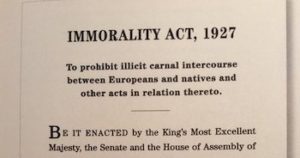
*On this date 1927, South Africa’s first Immorality Act was issued.
This was the title of acts of the Parliament of South Africa, which prohibited, amongst other things, sexual relations between white people and people of other races until amended first in 1950. Part of the Apartheid regime was installed to prohibit sex between whites and all non-whites. The Immorality Amendment Act, 1950 (Act No. 21 of 1950) amended the 1927 act to forbid unmarried sexual intercourse between "Europeans" and anyone not "European."
Later legislation closely related to the Immorality Act also banned the marriage of interracial couples outside of South Africa, viewing foreign marriages as invalid and illegal. The Immorality Act 1957 (Act No. 23 of 1957; subsequently renamed the Sexual Offences Act, 1957) repealed the 1927 and 1950 acts and replaced them with a clause prohibiting sexual intercourse or "immoral or indecent acts" between white people and anyone not white. It increased the penalty to up to seven years imprisonment for both partners. The 1957 act also prohibited brothel-keeping, procuring, and living off the proceeds of prostitution, and it prohibited sexual intercourse with people under the age of sixteen.
The Immorality Amendment Act, 1969 (Act No. 57 of 1969) amended the 1957 act to introduce or expand several offenses. It prohibited the manufacturing or selling of any "article intended to be used to perform an unnatural sexual act" (i.e., sex toys). The Immorality and Prohibition of Mixed Marriages Amendment Act, 1985 (Act No. 72 of 1985) repealed the provisions of the 1957 act that prohibited interracial sex and repealed the Prohibition of Mixed Marriages Act.
The Immorality Amendment Act, 1988 (Act No. 2 of 1988) was renamed the Immorality Act, 1957 to the Sexual Offences Act 1957. It criminalized, for the first time, a woman having sex with a person under the age of consent, setting the age of consent at 16 for a boy and 19 for a girl. The men-at-a-party offense (section 20A) was invalidated in 1998 by the Constitutional Court in the case of the National Coalition for Gay and Lesbian Equality v Minister of Justice.
The Criminal Law (Sexual Offences and Related Matters) Amendment Act, 2007, repealed most of the remaining provisions of the 1957 act. The only provisions still in force are those related to prostitution. The increased age of consent of nineteen for same-sex sexual activity (as opposed to sixteen for opposite-sex sexual activity) was invalidated in 2008 in the case of Geldenhuys v National Director of Public Prosecutions. However, by then, the 2007 Amendment Act had repealed the discriminatory provisions.